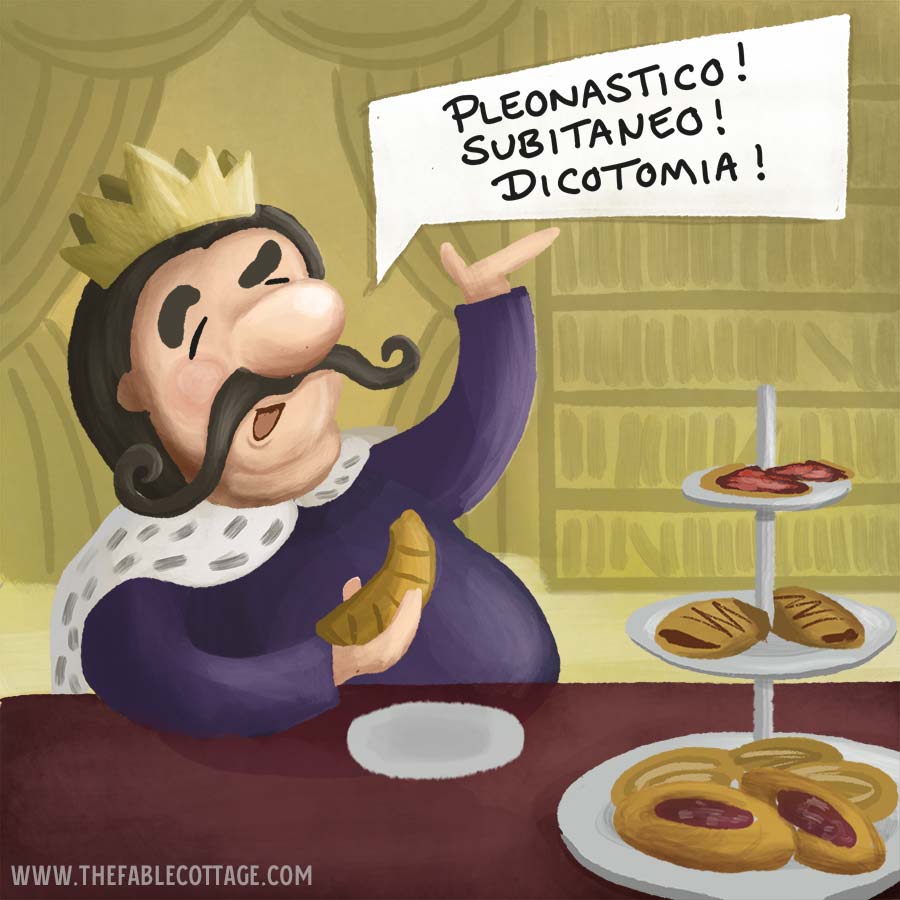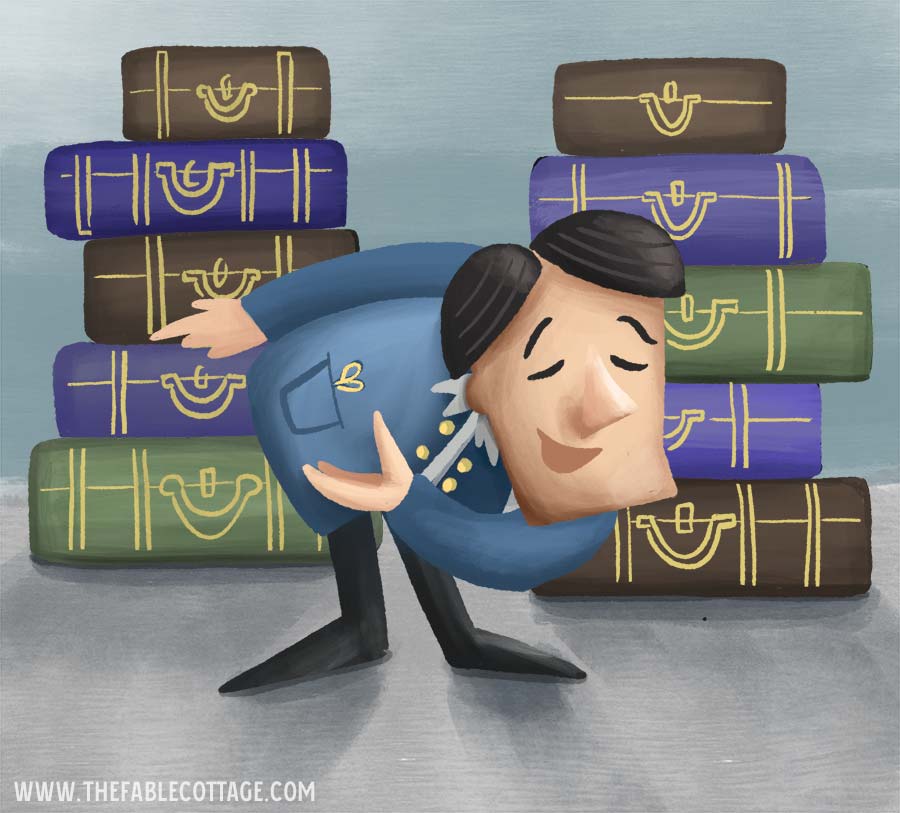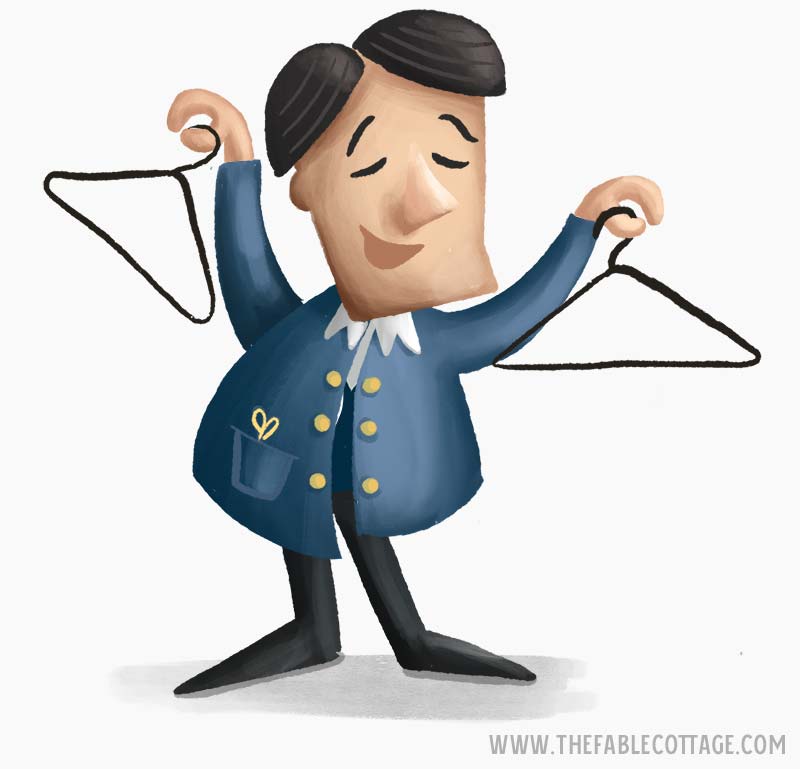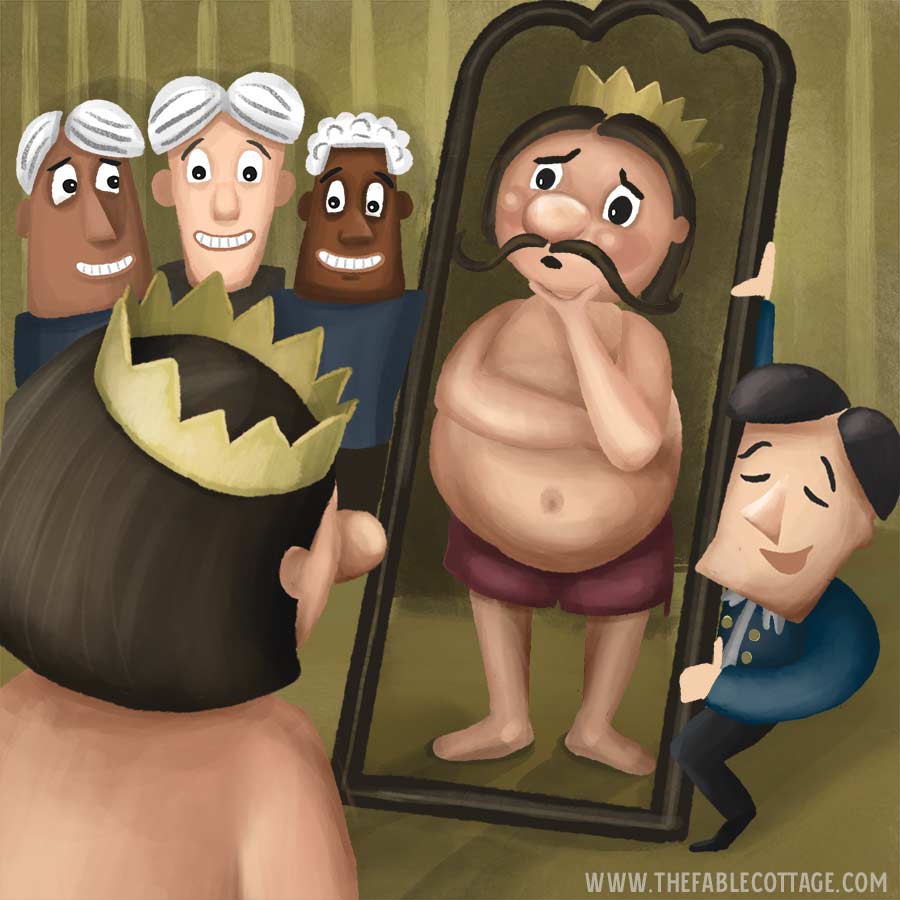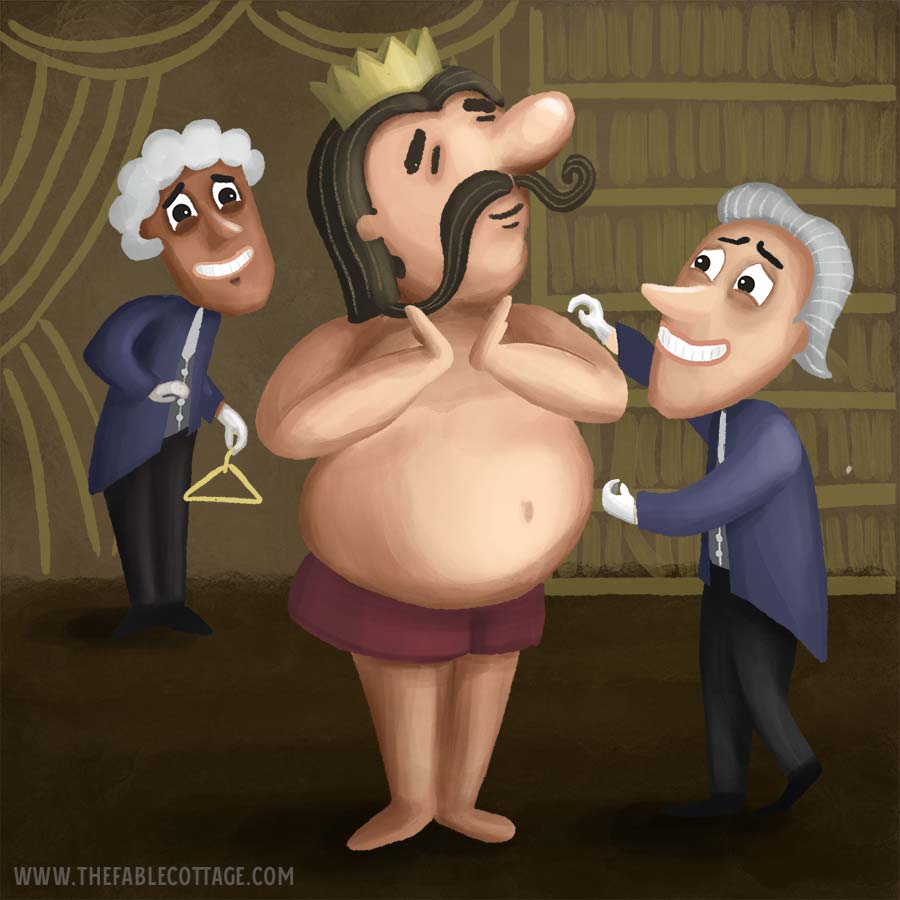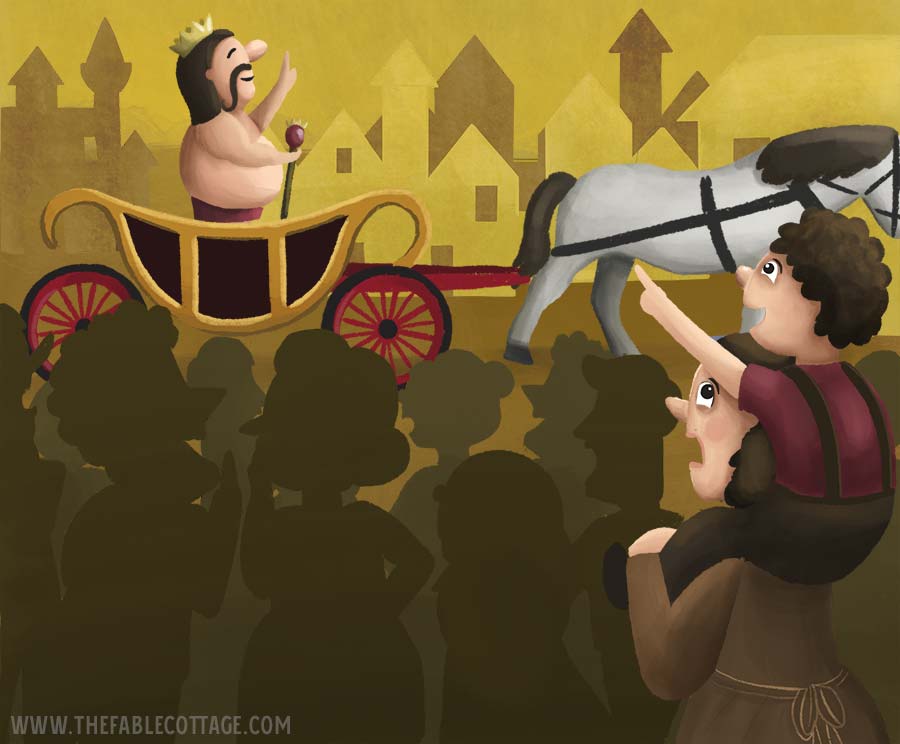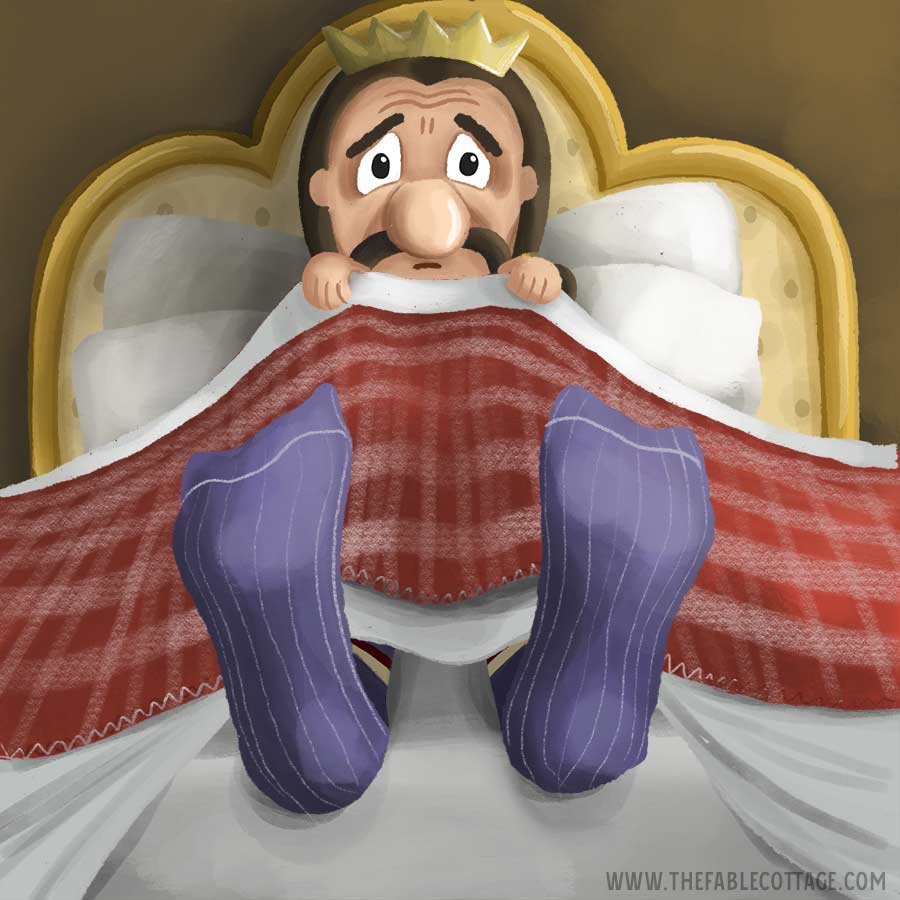C’era una volta un imperatore con un grossa pancia rotonda, delle sopracciglia folte e dei baffi lunghissimi. L’imperatore era molto vanitoso, e non faceva altro che pensare a sé stesso.
Once upon a time there was an emperor with a big round belly, bushy eyebrows and a long moustache. The emperor was very vain, and did nothing but think of himself.
“Sono veramente meraviglioso!” diceva. “Guardate le mie sopracciglia meravigliose! Guardate i miei baffi eccellenti! Ho un aspetto magnifico!”
"I'm truly wonderful!" he said. "Look at my wonderful eyebrows! Look at my excellent moustache! I look marvellous!"
All’imperatore piaceva tantissimo indossare dei vestiti raffinati. Aveva quattrocento camicie raffinati, trecento paia di pantaloni raffinati, e mille paia di calzini raffinati.
The emperor loved wearing fancy clothes. He had four hundred fancy shirts, three hundred pairs of fancy trousers, and a thousand pairs of fancy socks.
L’imperatore amava anche dire parole raffinati, come ad esempio “pleonastico”, “subitaneo”, e “dicotomia”.
The emperor also liked to say fancy words, such as "pleonastic", "sudden", and "dichotomy".
(L’imperatore non sapeva cosa volessero dire queste parole sofisticate, ma gli piaceva dirle lo stesso. Gli piaceva sembrare intelligente.)
“Sono così intelligente!” diceva. “Sono un GENIO!”
(The emperor did not know what these fancy words meant, but he liked to say them anyway. He liked to look intelligent.)
"I am so intelligent!" he said. "I am a GENIUS!"
Un giorno arrivò un uomo a palazzo e disse di essere un sarto. Disse di essere in grado di confezionare i vestiti più sofisticati dell’intera regione. (Ma, in realtà, quest’uomo era disonesto. Aveva guadagnato tutti i suoi soldi ingannando molte persone ricche).
One day a man came to the palace and said he was a tailor. He said he was able to make the most sophisticated clothes in the entire land. (But, actually, this man was dishonest. He had earned all his money by tricking many rich people.)
Il sarto portò all’imperatore dieci valigie.
“Sua maestà, intelligentissima e sofisticatissima,” disse.
The tailor brought the emperor ten suitcases.
"Your majesty, most intelligent and most sophisticated," he said.
... Tutti sanno che voi siete l’uomo più intelligente del mondo. E io ho creato dei vestiti stupefacenti. Questi vestiti sono solo per le persone intelligenti. Infatti, gli stupidi non riescono nemmeno a vederli, questi vestiti…”
... Everyone knows that you are the smartest man in the world. And I have created some amazing clothes. These clothes are only for intelligent people. In fact, stupid people can not even see them, these clothes ... "
L’imperatore batté le mani. “Magnifico! Con questi vestiti potrò sapere chi è intelligente e chi è stupido! Gli idioti non mi daranno mai più fastidio! Lasciami provare questi vestiti!”
The emperor clapped his hands. "Magnificent! With these clothes I will know who is smart and who is stupid! Idiots will never bother me again! Let me try these clothes!"
Il sarto fece svestire l’imperatore facendolo rimanere soltanto in mutande. Prese il metro e misurò le braccia, le gambe, le spalle dell’imperatore e tutta la sua grande pancia rotonda.
The tailor made the emperor undress, until he was wearing only his underwear (letting him remain with only his underwear). He took the tape and measured the arms, legs, shoulders of the emperor and all his big round belly.
Il sarto aprì una delle valigie.
“No, questo qui è troppo grande… no… questo è troppo piccolo… Ahh! Questo qui è perfetto!”
The tailor opened one of the suitcases.
"No, this one here is too big ... No ... this is too small ... Ahh! This one here is perfect!"
Fece finta di tirare fuori una camicia dalla valigia.
“Che cosa ne pensate?” chiese il sarto.
He pretended to pull a shirt out of the suitcase.
"What do you think?" asked the tailor.
L’imperatore sussultò: non vedeva niente davanti a sé!
“Non è bellissimo?” chiese il sarto. “E ricordate… solo le persone intelligenti riescono a vederlo!”
The emperor gasped: he saw nothing in front of him!
"Isn't it beautiful?" asked the tailor. "And remember ... only intelligent people can see it!"
Il sarto mise di nuovo le mani dentro la valigia. “Guardate questi pantaloni! Non sono bellissimi? E sono completamente invisibili agli idioti! E guardate questa giacca! Vedete che colori? Uno scimunito completo non vedrebbe assolutamente niente!”
The tailor reached (put his hands) back inside the suitcase. "Look at these pants! Aren't they beautiful? And they are completely invisible to idiots! And look at this jacket! Do you see those colors? A complete knucklehead would see absolutely nothing!"
“Oh, oh, sì… davvero belli!” balbettò l’imperatore. Ma era confuso. Perché non riusciva a vedere i vestiti?
"Oh, oh, yes ... very nice!" The emperor stammered. But he was confused. Why couldn't he see the clothes?
“Di certo io non sono un idiota!” pensò. “Un completo imbecille non conoscerebbe parole sofisticate come… Vestibolo! Crepuscolare! Schecchereccherebbe!”
"Of course I'm not an idiot!" He thought. "A complete fool would not know sophisticated words like ... 'Vestibule!' 'Crepuscular!' 'Chittering-of-birds!'"
Ma l’imperatore non disse nulla.
Il sarto fece finta di vestire l’imperatore con la camicia, i pantaloni, la giacca e le scarpe invisibili.
But the emperor said nothing. The tailor pretended to dress the emperor with invisible shirt, trousers, jacket and shoes.
L’imperatore era in piedi di fronte allo specchio. Voleva vedere i vestiti, ma l’unica cosa che vedeva era la sua grande pancia rotonda e le sue mutande.
“Non sono sicuro che questo sia il mio stile…” disse l’imperatore. “Ma lascia che chieda un secondo parere.”
The emperor stood in front of the mirror. He wanted to see the clothes, but the only thing he saw was his big round belly and his underwear.
"I'm not sure this is my style ..." said the emperor. "But let me get (ask for) a second opinion."
L’imperatore mandò a chiamare tre dei suoi amici più intelligenti.
“Amici! Cosa ne pensate di questi nuovi vestiti? Solo le persone intelligenti possono vederli. Gli stupidi non vedono un bel niente!”
The emperor sent for three of his most intelligent friends.
"Friends! What do you think of these new clothes? Only intelligent people can see them. Stupid people don't see anything! (a good nothing)"
Ovviamente, nemmeno gli amici dell’imperatore vedevano niente. Ma non volevano fare la figura degli stupidi.
Obviously, the emperor's friends saw nothing either. But they did not want to seem stupid (literally: do the figure of stupid people).
“Oh, sì! Che meravigliosa camicia!” disse il primo amico.
“Sì! Il colore dei pantaloni è perfetto,” disse il secondo amico.
“Belle scarpe!” disse il terzo amico.
"Oh yes! What a wonderful shirt!" said the first friend.
"Yes! The color of the trousers is perfect," said the second friend.
"Nice shoes! " said the third friend.
L’imperatore era eccitato. “Indosserò questi nuovi vestiti per la parata di domani!”
The emperor was excited. "I'll wear these new clothes for tomorrow's parade!"
L’imperatore diede al sarto un sacco di soldi. Il sarto se ne andò dal palazzo con dieci valigie piene d’oro. Una volta al sicuro sulla sua carrozza, se la rise di gusto.
“Che idiota!”
The emperor gave the tailor a lot of (literally: a bag of) money. The tailor left the building with ten suitcases full of gold. Once safely in his carriage, he laughed long and hard.
"What an idiot!"
Quella notte, l’imperatore non riuscì a dormire. Restò sveglio fino a tardi, a leggere i libri più grossi e pesanti della biblioteca.
That night, the emperor could not sleep. He stayed up late, reading the biggest and heaviest books in the library.
“Ho solo bisogno di trovare qualche altra parola sofistica, e allora sì che sarà in grado di vedere i miei vestiti,” pensò.
"I just need to find some more sophisticated words, and then I'll be able to see my clothes," he thought.
Al mattino, due servi vennero nella stanza dell’imperatore per vestirlo per la parata. Ovviamente nemmeno i due servi potevano vedere i vestiti. Ma non dissero nulla. Non volevano fare la figura degli stupidi.
In the morning, two servants came to the emperor's room to dress him for the parade. Obviously neither of the two servants could see the clothes. But they said nothing. They did not want to seem stupid (Literally: "do the figure of stupid people").
Fecero finta di vestire l’imperatore con i pantaloni invisibili, con la camicia invisibile, con la giacca invisibile e con il cappello invisibile.
They pretended to dress the emperor with invisible trousers, invisible shirt, invisible jacket and invisible hat.
L’imperatore si guardò allo specchio. Si fissò con cura strizzando gli occhi. Girò la testa a destra e a sinistra. E… un momento… eccolo là!
The emperor looked at himself in the mirror. He looked hard, squinting. He turned his head to the right and to the left. And ... wait (a moment)... there it is!
Con la coda dell’occhio, pensò di vedere una stoffa appena appena luccicante. Un motivo a quadri. Un pochino di colore. Riusciva a vedere i vestiti!
... Out of the corner of his eye (with the tail of the eye) he thought he saw a slight shimmering cloth. A checkered pattern. A tiny bit of color. He could see the clothes!
(In realtà non c’era nessun vestito. Ma spesso vediamo quello che vogliamo vedere.)
L’imperatore era felice: finalmente riusciva a vedere i vestiti.
“Andiamo alla parata!”
(In reality, there were no clothes. But we often see what we want to see.)
The emperor was happy: he could finally see the clothes.
"Let's go to the parade!"
Alla parata c’erano tutti. C’erano tutte le persone intelligenti: Tutti gli scienziati, tutti gli scrittori, tutti gli insegnanti. E anche tutti i bambini.
Everyone was at the parade. All the smart people were there, all the scientists, all the writers, all the teachers. And also all the children.
L’imperatore era in piedi sulla sua carrozza scoperta e salutava la folla. Ma mentre la carrozza dell’imperatore andava lungo la strada, la folla si zittì. La musica si fermò. Tutti quanti fissavano l’imperatore.
The emperor stood in his open carriage and waved to the crowd. But as the emperor's carriage went along the road, the crowd fell silent. The music stopped. Everyone was staring at the emperor.
“Questi vestiti devono essere magnifici…” pensò l’imperatore.
Ma poi, dal fondo della folla, un bambino gridò:
“Mamma, riesco a vedergli le mutande.”
"These clothes must be magnificent ..." thought the emperor.
But then, from the back of the crowd, a child shouted:
"Mama, I can see his underwear."
Tutti quanti sussultarono. Poi qualcuno cominciò a ridacchiare. E poi tutti quanti si misero a ridere, a ridere, a ridere a crepapelle. Battevano le mani e gridavano:
“MU-TAN-DE! MU-TAN-DE!”
Everyone gasped. Then someone started giggling. And then everyone began to laugh, and laugh, and laugh even louder. They clapped their hands and shouted:
“UN-DER-PANTS! UN-DER-PANTS!”
L’imperatore sentì la folla ridere. Capì che era stato ingannato. Non indossava nessun vestito speciale. Non indossava proprio un bel niente – solo le mutande.
The emperor heard the crowd laughing. He understood that he had been tricked. He wasn't wearing special clothes. He wasn't wearing anything at all — just his underpants.
L’imperatore saltò giù dalla carrozza e tornò di corsa al palazzo. Dietro di lui, continuava a sentire:
“MU-TAN-DE! MU-TAN-DE!”
Corse in camera sua e sbatté la porta.
The emperor jumped out of the carriage and ran back to the palace. Behind him, he continued to hear:
"UN-DER-PANTS! UN-DER-PANTS!"
He ran into his room and slammed the door.
Più tardi, quando i suoi amici lo trovarono, era disteso sul letto. Portava i suoi vestiti veri: le sue camicie raffinati, i suoi pantaloni raffinati, e tutte le mille paia di calzini raffinati.
Later, when his friends found him, he was lying on the bed. He wore his real clothes: his fancy shirts, his fancy pants, and all one thousand pairs of fancy socks.

Download this audio
Need help? How to download audio to your device


